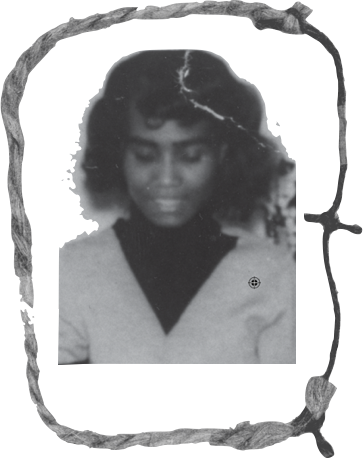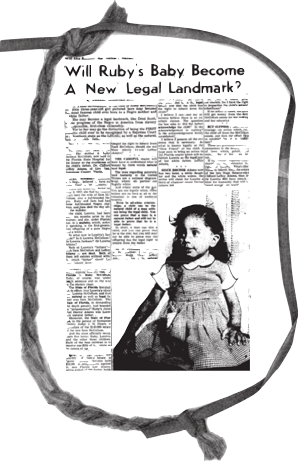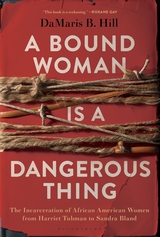
Harriet Beecher Spruill-Hill, United States European Command, Patch Barracks in Cold War Germany (circa 1953)
Harriet Beecher Spruill-Hill
April 16, 1928 and I don’t care to remember
. . . See, I had a grandma who could read at lightning speeds. Now some holy ghost, the best life had for her was this country’s secondhand soldier, a loving husband. No room for books and babies at her breasts. The sanctified think marriage is a type of reward if you are a second generation out of slavery color of coffee bean type of woman and your hair is some black lacquer of unruly licorice that has branches that wave like echoes. Her smile whiter than seashells, her breath the scent of tobacco. As narrow as a Carolina pine with worries “’bout the rage of white folks,” she died gifting me her photos. The only stories she would write. At birth her name becomes my velvet lush heirloom, tufted behind my mother’s.
SHUT UP IN MY BONES
(for Harriet Beecher Spruill-Hill)
I have the racket of anxiety in my genes
It rivets in ink. ’Spite this I leave these marks. This
evidence of us, undone. In wits’
end, it all ferments and we shape totems
of shame from our amusements.
The musk of my imagination
is as redolent as any untamed woman
and likewise, mistaken for mental illness.
Perfection is a mask, a perfume
in my pulse. I learn to hide
what is feared. To be literate
is to pen oneself with needles, shape beauty
from a funhouse mirror. This is how
artists learn the craft of display.
Call this confession a lie? Look closer.
I stubbed my toe tightrope walking
the lashes of circus clowns.
Only the liberated can see the legacies
of bondage stirring beyond the ribbons.
I have come to know. I am
the savory morsel in America’s
teeth. These words are clawed into
the enamel. My face is familiar
among the haints; I wear her likeness
like a caul.
See, I had a grandma who could read at lightning speeds. Now some holy ghost, the best life had for her was this country’s secondhand soldier, a loving husband. No room for books and babies at her breasts. The sanctified think marriage is a type of reward if you are a second generation out of slavery color of coffee bean type of woman and your hair is some black lacquer of unruly licorice that has branches that wave like echoes. Her smile whiter than seashells, her breath the scent of tobacco. As narrow as a Carolina pine with worries “’bout the rage of white folks,” she died gifting me her photos. The only stories she would write. At birth her name becomes my velvet lush heirloom, tufted behind my mother’s.
It is costly to stay free and appear
sane. I am she and an extravagant
kind, a shimmy spilling from
her buttons, the erotic unbridled,
a glimmer riding the golden. I am her
shrill of laughter clapping in doubt.
Curiosity is a coy friend. Chaos,
my alter ego. I mistook a jagged molar
for an ivory tower and I “ain’t got
the good sense God gave me
to rot.”

Page 21 of the Pittsburgh Courier, December 4, 1954
Ruby McCollum
[ August 31, 1909–May 23, 1992 ]
Ruby McCollum was born Ruby Jackson on August 31, 1909, in Zuber, Florida. At the age of twenty-two, she married Sam McCollum and the couple moved to Nyack, New York. The couple moved back to Florida in 1934 with their son Sam Jr. After sharing a home and business with Sam’s brother Buck McCollum, Sam and Ruby move to Live Oak, Florida. In Live Oak, they own a funeral home and a string of business, some illegal, all lucrative. The town doctor, C. LeRoy Adams, wants part of the business. The McCollums meet his monetary demands. Later the doctor wants Ruby, wife of Sam and mother of three children. He is from a southern family and thinks she is his right, a paramour, a white man’s pleasure, a Black mistress of his choosing to bear his children. Dr. C. LeRoy Adams is soon elected senator. He is busy, but he still finds the time to father Ruby McCollum’s fourth child. He may have fathered her fifth child if Ruby hadn’t shot him and ended the relationship on August 3, 1952. We will not know. She was not allowed to testify during her trial. She was convicted of murder and later declared crazy.
Zora Neale Hurston, a writer and anthropological scientist, has done extensive research on paramour rights in the timber mills of Northern Florida. She covers Ruby’s trial for the Pittsburgh Courier before the newspaper stops paying for Zora’s reports. Despite this, Hurston writes about McCollum after her conviction. Hurston also revisits some of the particulars of McCollum’s case in a short story titled “The Conscience of the Court” for the Saturday Evening Post. Solidarity stokes a strong pen.
RUBY McCOLLUM
They lie. Some say that Ruby and her
husband, Sam, are Live Oak’s Black Bonnie
and Clyde, but make no mention of her fine house
with a pool and the ring of policemen swimming
in her and Sam’s pockets.
I swear, between Alabama and the Gulf, it’s hard
to keep anything out of a gator’s mouth, out
of a raccoon’s grip. Some bandits are dirty
as the Devil, crawling into the yard reaching . . .
Greedy bandits treat an open window
as an invitation. You can find them fat and splayed,
sultan kings crisscrossed in your satins. They reach,
clawing you close, whispering “paramour,” threatening
to tear any black man to pieces. These are the ways, he
is going to disrobe you, fit you to bear his rascals.
A raccoon never retreats, not for threat of bait
or broom. They will run you ragged, race.
Ever wake to find yourself prostrate
Dr. Adams’ floor, dressed for church,
praying for a prescription or some poison? Ruby
needed a bit of something to rid her of the little
rascal scratching inside. No? Who else
would she call when a critter insists on living
within her walls?
___________________________

From A Bound Woman Is a Dangerous Thing: The Incarceration of African American Women from Harriet Tubman to Sandra Bland. Used with permission of Bloomsbury Publishing. Copyright 2019 by DaMaris Hill.
DaMaris Hill
Dr. DaMaris B. Hill is a writer. Her books include The Fluid Boundaries of Suffrage and Jim Crow: Staking Claims in the Heartland and \ Vi-zə-bəl \ \ Teks-chərs \ (Visible Textures), a short collection of poems. Dr. Hill serves as an Assistant Professor of Creative Writing and African American and Africana Studies at the University of Kentucky.













